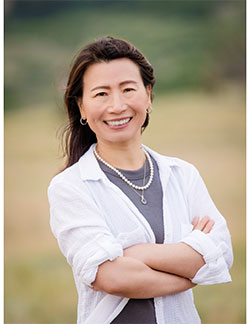UW’s Li-Oakey Receives DOE Grant to Study Covalent Organic Frameworks
Published July 29, 2024

A University of Wyoming professor will study 2D covalent organic frameworks (COFs) -- a family of materials that, by design, can have high crystallinity, narrow pore size distribution and simultaneous high selectivity and flux, and are considered the “holy grail” of separation materials.
Despite the potential of 2D COFs to break the permeability-selectivity trade-off, the use of 2D COFs in separation materials has been limited by their poor long-range order, according to Katie Li-Oakey, a professor and undergraduate coordinator in UW’s Department of Chemical and Biomedical Engineering.
“The crux of this research is to fundamentally understand how defects affect material properties during their synthesis, which consequently cause discrepancy between their theoretically designed properties and their performance in engineering applications,” Li-Oakey says.
To assist her to that end, Li-Oakey received a U.S. Department of Energy (DOE) Continuation of Solicitation for the Office of Science Financial Assistance Program $660,000 grant over three years for her project titled “Single-Crystalline and Polycrystalline Covalent Organic Framework Membranes: Experimentally and Theoretically Connecting Formation Conditions to Mass Transfer and Selectivity Performance.” The grant, through the DOE’s Office of Basic Energy Services, starts Aug. 1 and ends July 31, 2027.
Until recently, only a few high-quality COFs have been synthesized, with even fewer employing robust chemical linkages and mild, rapid synthesis conditions, each of which are necessary for their broad adoption in separation science, according to the grant abstract. To address these challenges, her team synthesizes large single-crystal COFs under mild conditions and subsequently integrated into membranes for mass transfer mechanism studies.
The DOE grant has three objectives:
-- Key chemical and physical drivers will be identified that lead to single-crystal COF formation using both atomistic modeling and direct experimental verification. Such understanding in synthesized COFs has the potential to accelerate new separation materials discovery and subsequent use in targeted applications.
-- Atomistic modeling with external pressure field -- instead of only molecular diffusion -- will be employed to simulate experimental filtration processes.
-- Functional COF membranes, with different degrees of polycrystallinity, will be used to separate dyes and critical minerals to assess separation performance metrics.
Li-Oakey is the principal investigator (PI) on the project, with the research to take place on the UW campus. She will collaborate with Adri van Duin, Distinguished University Professor of Mechanical Engineering, Chemical Engineering, Engineering Science and Mechanics Chemistry, Chemistry, Materials Science and Engineering and director of the Materials Computation Center at Penn State University; and Will Dichtel, the Robert L. Letsinger Professor of Chemistry at Northwestern University. Both will serve as co-PIs on the grant.
Caleb Johannesmeyer, a UW senior from Sheridan majoring in chemical engineering, also will assist with the grant project. Additionally, Li-Oakey is recruiting other students to be part of the grant.
“I have been working in the field of membrane materials for over 25 years and have seen, in my own and other colleagues’ work, how carefully designed and synthesized high-performance materials often have unexpectedly poor performance in engineering applications,” Li-Oakey says. “This grant allows me to work with a talented collaborative team, consisting of pioneers in atomistic modeling and COF material synthesis, to narrow the gap between designed COF materials and their targeted engineering applications.”
The research has practical applications, she says.
“The research outcomes can be used to enable large area, high-quality membrane materials that have superior separation performance for pharmaceutical product purification; critical mineral -- such as rare earth element -- concentration and purification; as well as for battery separators,” Li-Oakey says.
Her areas of research at UW center around multiscale materials and understanding solid-liquid interfaces under nonconfinement, including liquid filtration in energy exploration-related activities, such as water management in coal bed methane and hydraulic fracturing; thin film and coating material development; and fuel cell catalysts and membrane materials.
Li-Oakey received her Ph.D. in chemical and biological engineering from the University of Colorado-Boulder; her master’s degree in chemical engineering from Tianjin University in Tianjin, China; and her bachelor’s degree in chemical engineering from Shandong University in Jinan, Shandong, China. She was a postdoctoral fellow from 2003-05 at the University of Colorado-Boulder.

